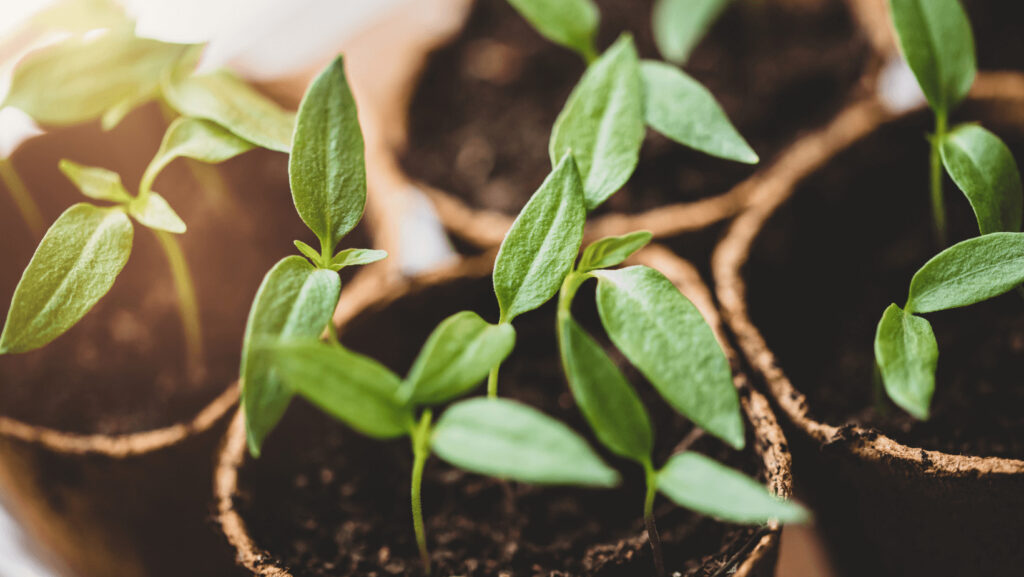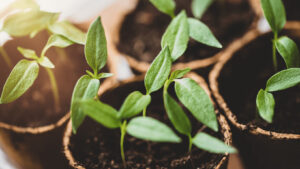On the surface of it, it’s hard to see how you can eliminate plastic from your garden. Plastic pots, planting labels, seed trays…the range of plastic items available from garden centres is overwhelming. However, with a little forethought it is possible to minimise, if not fully eliminate, plastic from your garden. Why not have a go this month, as it is Plastic Free July, to cut down on the amount of plastic you are consuming?
Firstly, if you’re considering getting an artificial lawn installed, think again. As well as being literally made of plastic, artificial grass is awful for the ecosystem. Salespeople will try to convince you that compared to a lawn, it’s low-maintenance – it’s not. Artificial lawn requires sweeping, weeding, and gets unbearably hot compared to natural turf. Further to this, it doesn’t last forever so you might find you spend thousands only for it to degrade over the years and need re-installing, with the old plastic turf heading to landfill. To find out more about the Time for Turf campaign, visit my blog here.
One of the biggest culprits for plastic use in the garden are the number of pots that are consumed. Virtually every single plant you buy is in a plastic pot; more often than not, the pots or trays you buy to plant seeds in are plastic, too. It can be difficult to find an alternative to plastic when searching for plants in garden centres; but there are options out there if you look. Coir or cardboard pots are becoming more popular. Ask your local garden centre about them; if the demand is there then the tide will start to turn. Try Posipot for an alternative option.
If you’re growing your own, for no cost at all you can re-use toilet paper rolls and plant in the ground once the plants are big enough, or invest in a wooden Paper Potter – this is a little wooden device that enables you to create your own seed pots from old newspaper or similar. If you really must buy pots, then choose the recycled cardboard variety. Remember to check with your local authority, as many plastic plant pots can be put into your normal household recycling – no need for them to be thrown away at the end of their useful lives – and they can be used over and over again; only recycle them away once they have broken.
As for gardening tools; all too often modern tools have plastic incorporated somewhere; whether that be plastic handles or being wrapped in plastic. Choose wooden handled tools and consider trawling car boot sales for vintage items – they are often far more hardwearing and look more attractive, too. An old aluminium watering can will last you for a lifetime, whereas a plastic one will degrade in the sun, crack, leak and end up being thrown away. One of my favourite tools is an old wooden dibber that is basically a broken spade handle with the end whittled to a point. Reusing items in the garden is a great way of avoiding plastic; recently I’ve been putting aside the wooden stick every time anyone in the house eats an ice lolly – I’ve quickly built up a good stock of ready-made plant markers without any need for any nasty plastic sticks wrapped in even more plastic.
Compost and manure, if bought from the garden centre, comes in plastic. It’s hard to buy it without this being the case. The best possible options are to make your own compost and make friends with a local stable yard, so you can take your own bags and fill up on virtually free manure. If these options are really too much, then try to save, reuse or recycle the bags. Making your own compost is easy and very rewarding and can be done in a surprisingly small space.
Pest control doesn’t have to be plastic based, either. Sprays, slug pellets, and other ecology-harming pest control measures all come in plastic bottles or tubs – but there are other options. Consider natural methods of pest control, such as slug traps (a bowl of beer set into the ground) or the use of ladybirds to keep the aphids down. Encourage birds and amphibians to your garden to help you keep on top of the slugs and snail population. All entirely plastic free and massively beneficial to your own little ecosystem. Also useful are alternative wool-based slug deterrent top-dressings such as produced by Hortiwool, Chimney Sheep and Slug-Gone.
Follow me on Facebook and Instagram for more tips on how to garden plastic-free.


